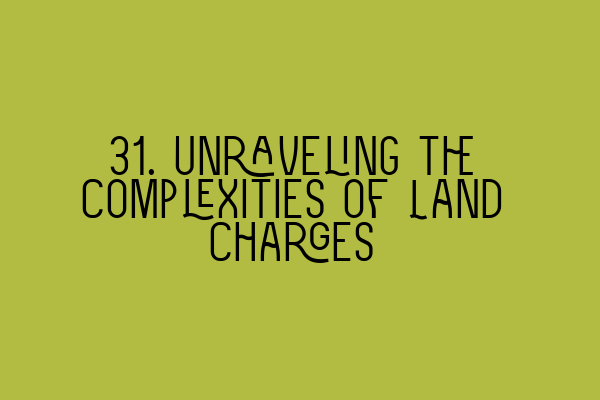Unraveling the Complexities of Land Charges
As property law solicitors, we often come across complex legal concepts that can be confusing to the average person. One such concept is land charges. Understanding land charges is essential for anyone involved in property transactions, whether you’re buying or selling a property, taking out a mortgage, or investing in land.
In this blog post, we will unravel the complexities of land charges and shed light on some of the important aspects you need to be aware of. So, let’s dive in and explore this important topic!
What are Land Charges?
Land charges are legal interests or rights that affect registered land, but are not recorded on the title register. These charges are registered at the Land Charges Department of the HM Land Registry and can have a significant impact on property transactions.
Examples of Land Charges
There are several types of land charges that can be registered against a property. Some common examples include:
1. Restrictive Covenants: These are restrictions imposed by previous owners that limit the use or development of the land. They can range from limitations on building extensions to prohibitions on certain activities.
2. Equitable Charges: These charges arise when a property owner borrows money against their property, often through a second charge mortgage. Equitable charges are not registered on the title register, making it important to conduct thorough searches to uncover any potential charges.
3. Ancestral Rights: Certain properties may be subject to ancestral rights, which can include rights of way, grazing rights, fishing rights, or mineral rights. These rights may have been granted many years ago and can impact the use and enjoyment of a property.
4. Chancel Repair Liability: This is a historical land charge that can affect properties located within an old ecclesiastical parish. It requires property owners to contribute towards the repair of the local church.
These are just a few examples of the many types of land charges that exist. Each charge has its own legal implications, and it’s important to understand their nature and effect before proceeding with a property transaction.
Conducting Land Charges Searches
When buying or selling a property, it’s crucial to conduct land charges searches to uncover any potential charges that may affect the property. These searches provide information on any registered land charges, giving parties involved in the transaction a clear picture of any encumbrances on the property.
Land charges searches can be conducted through the Land Charges Department of the HM Land Registry or by using online search platforms. The search results will reveal if there are any outstanding charges, restrictions, or other legal interests that need to be addressed during the transaction.
Addressing Land Charges
Once land charges have been identified, they need to be addressed appropriately to ensure a smooth property transaction. Depending on the type of charge, various steps can be taken to resolve or mitigate their impact on the transaction.
For example, restrictive covenants can be modified or discharged through the Lands Tribunal if certain conditions are met. Equitable charges can be paid off or transferred to the new owner, while ancestral rights may require negotiations or legal actions to resolve.
It’s important to seek professional legal advice when dealing with land charges to ensure compliance with legal requirements and protect your interests. At SQE Property Law & Land Law, our experienced solicitors can guide you through the complexities of land charges and help you navigate the legal landscape.
Conclusion
Land charges are an important aspect of property law that can have a significant impact on property transactions. Understanding the different types of land charges, conducting thorough searches, and addressing any identified charges appropriately are essential steps in ensuring a smooth and successful property transaction.
If you’re preparing for the SQE Property Law or Land Law exams, it’s crucial to have a solid understanding of land charges. Check out our related articles for comprehensive exam preparation resources:
– SQE 1 Practice Exam Questions
– SQE 1 Practice Mocks FLK1 FLK2
– SQE 2 Preparation Courses
– SQE 1 Preparation Courses
– SRA SQE Exam Dates
Remember, knowledge is power when it comes to property law, and being well-versed in land charges will give you a competitive edge in your legal career. If you need expert guidance or legal assistance, don’t hesitate to reach out to SQE Property Law & Land Law. We’re here to help you navigate the complexities of land charges and achieve your property law goals.
